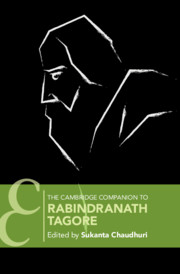Book contents
- Frontmatter
- Contents
- List of Illustrations
- Notes on Contributors
- Preface
- Note on Conventions and Practices
- 1 Rabindranath Tagore: From Art to Life
- 2 A Garland of Many Tagores
- Part I Overviews
- Part II Studies
- 12 Women, Gender, and the Family in Tagore
- 13 On the Seashore of Endless Worlds: Rabindranath and the Child
- 14 Tagore's View of History
- 15 Tagore's View of Politics and the Contemporary World
- 16 Tagore's Santiniketan: Learning Associated with Life
- 17 Tagore and Village Economy: A Vision of Wholeness
- 18 An Ecology of the Spirit: Rabindranath's Experience of Nature
- 19 Rabindranath and Science
- 20 Rabindranath Tagore as Literary Critic
- 21 Tagore's Aesthetics
- 22 Rabindranath, Bhakti, and the Bhakti Poets
- 23 Tagore and the Idea of Emancipation
- 24 Tagore's Thoughts on Religion
- 25 Rabindranath Tagore and Humanism
- List of Tagore's Works Cited, with Index
- Further Reading
- General Index
14 - Tagore's View of History
from Part II - Studies
Published online by Cambridge University Press: 24 December 2019
- Frontmatter
- Contents
- List of Illustrations
- Notes on Contributors
- Preface
- Note on Conventions and Practices
- 1 Rabindranath Tagore: From Art to Life
- 2 A Garland of Many Tagores
- Part I Overviews
- Part II Studies
- 12 Women, Gender, and the Family in Tagore
- 13 On the Seashore of Endless Worlds: Rabindranath and the Child
- 14 Tagore's View of History
- 15 Tagore's View of Politics and the Contemporary World
- 16 Tagore's Santiniketan: Learning Associated with Life
- 17 Tagore and Village Economy: A Vision of Wholeness
- 18 An Ecology of the Spirit: Rabindranath's Experience of Nature
- 19 Rabindranath and Science
- 20 Rabindranath Tagore as Literary Critic
- 21 Tagore's Aesthetics
- 22 Rabindranath, Bhakti, and the Bhakti Poets
- 23 Tagore and the Idea of Emancipation
- 24 Tagore's Thoughts on Religion
- 25 Rabindranath Tagore and Humanism
- List of Tagore's Works Cited, with Index
- Further Reading
- General Index
Summary
Rabindranāth Tagore's writings on history cover three chief areas of interest. One is his philosophy of history, particularly in the context of free will and determinism. Here he basically asks the question: Is a human being and a citizen a free agent, or is he an instrument of the historical forces of his times? A second area covers issues arising out of historical narrative: events, personalities, and the long-term course of history. Here his chief focus of interest is the history of Indian civilization, but some of the most valuable discussions relate to global history, European civilization in particular. The third area extends beyond history to historiography: Tagore is critical of the colonial school of writing and offers his own interpretive approach. These three strands are interwoven and cannot be studied in isolation from each other. They are necessarily combined in the account that follows.
We must also bear in mind that Tagore was essentially a poet, and his perception of history finds expression not only in his discursive prose but also in his poetry, fiction, and literary criticism. There was a time in India when works of history were written in verse. In Tagore's poems based on historical annals and legends, most memorably collected in Kathā o kāhini (1908), one can discern traces of that centuries-old tradition. He sourced many verse-tales from Buddhist legends in texts such as the Avadānashataka, Bodhisattva-avadāna, Mahāvastu, and Divyāvad namālā. On another plane, he imbibed and extended the nascent nationalism that found soil in the history of the Sikhs and the Marāthās, and the historical legends and folk traditions of Rājasthān. Perhaps more importantly, he found a major source of inspiration for his poems and songs, with actual formal models, in the medieval saintly traditions associated with Kabir, Tulsidās, and others, and the Vaishnavite poetry and culture of Mithil and Bengal.
In an essay on the historical novel (‘Aitihāsik upanyās’), Tagore observes that a disconnect between actual history and fiction based on history is natural and inevitable. He quotes the English historian E. Augustus Freeman's comment that if anyone wishes to learn about European history at the time of the Crusades, he must studiously avoid reading Scott's Ivanhoe. Tagore recognized the educational value of historical tales and dramas.
- Type
- Chapter
- Information
- The Cambridge Companion to Rabindranath Tagore , pp. 268 - 278Publisher: Cambridge University PressPrint publication year: 2020



